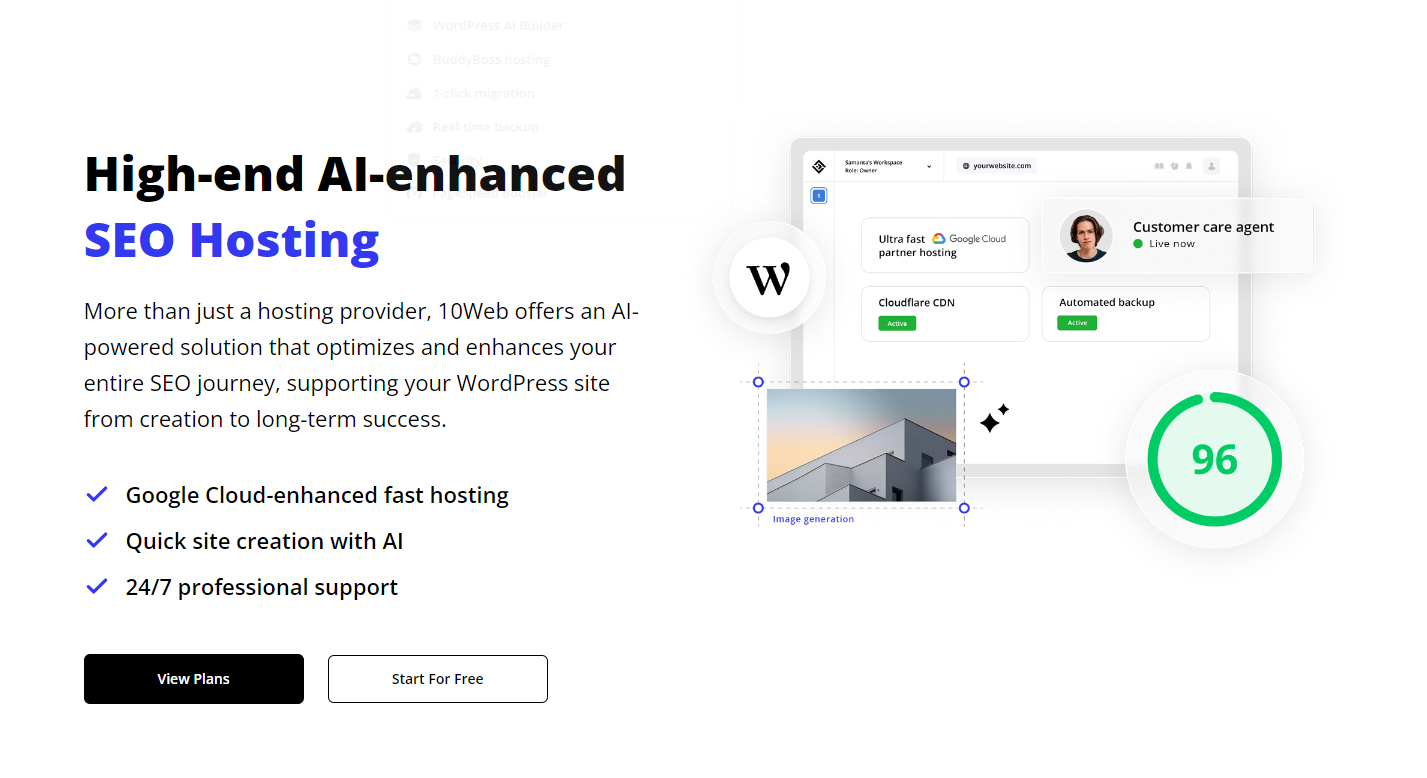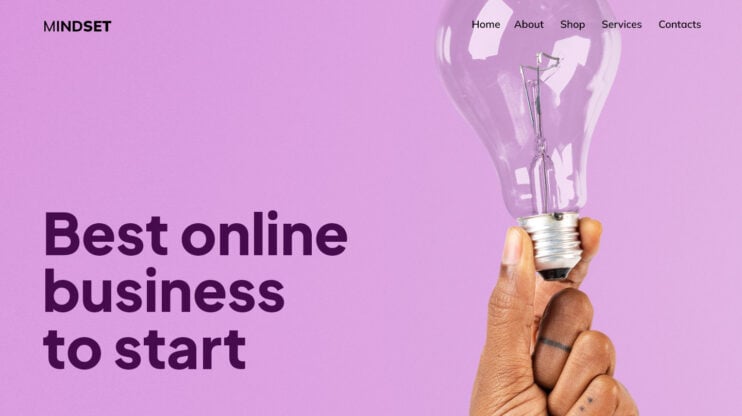Blogging can be more than just a hobby. It can be a way to make money blogging and earn money online. Many people start blogs to share their thoughts and ideas. But they soon find out they can make money from their writing too.
There are different ways to make money with a blog. You can sell products or services. You can put ads on your site. Or you can work with brands to promote their stuff. The key is to build an audience first.
This guide will cover the key aspects of earning money through blogging, including content strategies for growth and various monetization techniques.
FAQ
Can you make $1,000 a month with a blog?
Can I actually make money from blogging?
How long does it take to make $1,000 per month blogging?
How much can I earn from 1,000 views on my blog?

Create your online store in minutes!
Looking to sell online? Develop and launch your store with 10Web AI Ecommerce Website Builder.
Laying the foundation
A strong foundation is key for a successful blog that makes money. It takes planning and work upfront but pays off in the long run. Let’s look at the important first steps to start a profitable blog.
Choosing a profitable blogging target
Pick a topic you know well and enjoy writing about. Look for target topics with enough demand but not too much competition. Some good options are:
- Personal finance
- Health and fitness
- Food and recipes
- Travel
- Personal development
Research keywords to see what people are searching for. Use free tools like Google Trends to check interest over time. Make sure there are products or services you can promote to earn money.
Understanding the basics of SEO
SEO helps your blog posts show up in search results. This brings free traffic to your site. Some key SEO tips:
- Use your main keyword in your title, headings, and throughout the post
- Write helpful content that answers people’s questions
- Include internal links to other posts on your site
- Get backlinks from other sites in your niche
- Make your site mobile-friendly and fast to load
Learn the basics of on-page and off-page SEO. Keep up with changes to search algorithms. SEO takes time but is worth the effort for long-term blog success. You can even use AI to help you with SEO!
There are website builders like the 10Web AI Website Builder that can help you build an SEO-optimized blog website from scratch, without requiring extra knowledge on the topic.


Create your online store in minutes!
Looking to sell online? Develop and launch your store with 10Web AI Ecommerce Website Builder.
Creating high-quality content
Good content is the heart of a money-making blog. Write posts that are:
- Helpful and solve a problem for readers
- Well-researched with accurate info
- Easy to read with short paragraphs and subheadings
- At least 1,000 words for most posts
- Unique – don’t just copy what others have written
Use a mix of content types like how-to guides, lists, and personal stories. Add images, videos, or infographics to make posts more engaging. Proofread carefully before publishing. High-quality content builds trust with readers and keeps them coming back.
Creating online presence
Next, choose a platform to establish your online presence, and 10Web Blog Website Builder is an excellent place to start. Using 10Web’s AI-powered platform, you can generate a customized blog site without needing coding skills.
The platform offers tools specifically designed to help you monetize your blog efficiently. Here’s how 10Web’s features can help:
- AI Ecommerce Website Builder: This tool allows you to quickly create a personalized blog by describing your niche and business. The AI generates a complete website, with full customization for content and layout.
- WooCommerce integration: Ideal for bloggers who want to sell products or services, WooCommerce helps you set up an online store seamlessly alongside your blog.
- 10Web booster: Boost your blog’s speed and performance with automatic PageSpeed optimization, helping you rank higher on search engines and improve user experience.
- Analytics and marketing tools: Built-in tools to track your audience, optimize your blog content, and implement effective marketing strategies like email campaigns and ads.
By leveraging these tools, bloggers can create an attractive, fully functioning site where they can monetize their content through ads, affiliate marketing, digital products, or services.
With 10Web’s powerful tools, you can easily turn your blogging passion into a profitable venture.

Create your online store in minutes!
Looking to sell online? Develop and launch your store with 10Web AI Ecommerce Website Builder.
Expanding online presence
Build your brand beyond just your blog. This helps grow your audience and income. Ways to expand your online presence:
- Be active on social media like Pinterest and Instagram
- Start an email list to connect with readers
- Guest post on other blogs in your niche
- Create a YouTube channel with video content
- Network with other bloggers at events or online
Pick 1-2 platforms to focus on at first. Post regularly and engage with followers. Cross-promote your blog content on other channels. A strong online presence helps you reach more people and make more money from blogging.
Content strategies for growth
Growing a blog takes smart content choices. The right approach can boost your reach and income potential.
Utilizing keywords to maximize reach
Keyword research helps blogs get found online. Use tools like Google Keyword Planner to find popular search terms in your niche. Add these keywords to your post titles, headings, and content.
Mix in long-tail keywords as well. These are longer, more specific phrases. They often have less competition. This makes it easier to rank for them in search results.
Place keywords naturally in your writing. Don’t stuff them awkwardly. Google may penalize your site if you overdo it. Aim for 1-2% keyword density in your posts.
Leveraging content marketing techniques
Content marketing spreads your blog’s message. Create helpful, shareable content like how-to guides and infographics. This can attract new readers and links to your site.
Guest posting on other blogs in your niche builds connections. It also gets your name out there. Be sure to link back to your own blog in your author bio.
Use social media to promote your content. Share snippets or teasers from your posts. This can drive traffic back to your blog. Engage with followers to build a community around your brand.
Email marketing keeps readers coming back. Offer a newsletter sign-up on your blog. Send regular updates with your latest posts and exclusive content.
Monetization methods
Bloggers can use several ways to earn money from their websites. These include partnering with brands, showing ads, and selling their own digital items.
Introducing affiliate marketing
Affiliate marketing lets bloggers make money by promoting other companies’ products. When readers click a special link and buy something, the blogger gets a cut. This method works well for many types of blogs. Fashion bloggers can share links to clothes. Tech reviewers can link to gadgets. Food bloggers can recommend kitchen tools.
To start, bloggers pick products that fit their niche. They then write honest reviews or add links naturally in their posts. It’s key to choose items readers will like. Bloggers should also tell readers about affiliate links. This builds trust.
Some popular affiliate programs are Amazon Associates and ShareASale. These offer a wide range of products to promote. Bloggers can also reach out to brands directly for custom deals.
Exploring advertising options
Ads are a common way for blogs to make money. Bloggers can show ads from networks or work with brands directly. Google AdSense is a popular choice for beginners. It’s easy to set up and shows relevant ads to visitors.
For more control, bloggers can sell ad space directly to companies. This often pays more but takes more work. Bloggers need a good amount of traffic to interest advertisers. They can offer different ad sizes and places on their site.
Native ads are another option. These look like regular blog posts but are marked as sponsored. They tend to perform better than banner ads. Video ads can also work well for blogs with the right audience.
Offering digital products and ebooks
Creating and selling digital products is a great way for bloggers to boost their income. Ebooks are a popular choice. Bloggers can write guides or stories related to their niche. For example, a cooking blog might sell a recipe book.
Online courses are another option. Bloggers can teach skills they’ve mastered. A photography blog could offer lessons on taking better photos. Webinars, templates, and printables are other ideas.
To sell these items, bloggers can use platforms like Gumroad or Teachable. These handle payments and delivery. Some bloggers also add shops to their own websites. This gives them more control but requires more setup.
Pricing is key for digital products. Bloggers should research what similar items sell for. It’s often good to start with lower prices and raise them over time.

Create your online store in minutes!
Looking to sell online? Develop and launch your store with 10Web AI Ecommerce Website Builder.
Building your audience
Getting more readers is key to making money from your blog. You need to connect with people who care about what you write. Let’s look at some ways to do this.

Engaging and retaining readers
Write content people want to read. Pick topics your audience cares about. Use simple words and short sentences. Break up text with headings, lists, and images.
Ask readers questions at the end of posts. This gets them talking in the comments. Reply to comments to keep the chat going.
Make your blog easy to read on phones. Many people browse on mobile devices. Test your site on different screens to make sure it looks good.
Add social share buttons to your posts. This lets readers spread your content. Put these buttons in easy-to-see spots.
Effective use of social media
Pick the right social platforms for your blog. Go where your readers are. Facebook and Instagram work for many topics. X is good for news and quick updates.
Post often, but not too much. Once or twice a day is usually enough. Share your blog posts, but mix in other content too.
Use hashtags to help people find your posts. Research popular tags in your niche. Don’t use too many – two or three is plenty.
Join groups related to your blog topic. Share helpful tips, not just links to your site. This builds trust with potential readers.
Growing your email list
Add signup forms to your blog. Put one at the end of posts and in the sidebar. Keep forms short – just ask for email addresses at first.
Offer something free to get signups. This could be an ebook, checklist, or short course. Make sure it’s useful to your readers.
Send a welcome email right away. Thank new subscribers and tell them what to expect. Include links to your best content.
Email your list regularly. Once a week is a good start. Share your new posts and extra tips. Keep emails short and focused on one main idea.
Leveraging affiliate networks
Affiliate networks connect bloggers with companies offering products to promote. They provide tools and tracking to manage affiliate partnerships and commissions.

Choosing the right affiliate programs
Look for programs that fit your blog’s niche and audience. Popular networks like Amazon Associates and ShareASale have many options. Check commission rates, which can range from 5% to 50% or more. Some programs pay per sale, while others pay per lead or click.
Consider the products you want to promote. Pick items you’ve used and can recommend honestly. Read the terms carefully. Look at cookie duration, which affects how long you earn commissions after a click. Longer cookie windows give you more chances to earn.
Sign up for a few programs to start. Test different ones to see what works best for your blog. Track your results to focus on the most profitable partnerships.
Creating trust with product reviews
Write honest, detailed reviews of affiliate products. Share your real experience using the item. Explain what you liked and didn’t like. Include photos or videos if possible. This helps readers make informed choices.
Disclose your affiliate relationships clearly. Tell readers you may earn a commission from purchases. Place this info near the top of posts with affiliate links. Be upfront about sponsored content too.
Don’t just praise products. Point out pros and cons. This builds trust with your audience. They’ll value your opinion more if you’re balanced. Only promote items you truly believe in. Your blog’s reputation matters more than quick affiliate sales.
Diversifying income streams
Bloggers can boost their earnings by adding different ways to make money. This helps protect their income if one source slows down.
Venturing into consulting services
Many bloggers use their knowledge to offer consulting. They can help others in their niche with problems or questions. Consulting can be done online or in person. Bloggers can charge by the hour or for a set project. This can be a good way to earn more money from a blog’s audience. It also helps build the blogger’s reputation as an expert.
Hosting workshops and speaking gigs
Bloggers can share their skills through workshops and talks. They might teach a class on their blog topic or speak at events. This can bring in extra money and help grow their audience. Online workshops are popular and can reach people all over. In-person talks at conferences or local groups can also pay well. These activities help bloggers network and build their brand.
Advertising revenue
Bloggers can earn money by displaying ads and creating sponsored content. These methods allow you to make money from your blog traffic and industry connections.
Maximizing earnings with display ads
Display ads are a common way for bloggers to make money. Google AdSense is a popular ad network that pays bloggers for showing ads on their sites. To boost your earnings, focus on increasing your blog traffic. More visitors mean more ad views and clicks.
Place ads in spots where readers will see them, like the sidebar or between paragraphs. But don’t overdo it – too many ads can annoy readers. Test different ad sizes and placements to find what works best.
The amount you earn depends on factors like your niche and audience. Some topics pay more per click than others. AdSense pays around $1.25 per 1,000 ad views on average. With enough traffic, this can add up to a nice income.
Benefits of sponsored content
Sponsored posts are another way to make money blogging. Companies pay you to write about their products or services. This can pay more than display ads for each post.
To get sponsored post deals, build your blog’s reputation and audience first. Companies want to reach lots of people through your blog. Show your traffic stats and engagement rates when pitching to brands.
Sponsored content should fit your blog’s style and topics. Only promote products you believe in. Be clear with readers that the post is sponsored. This keeps trust with your audience while making money.
You can charge more for sponsored posts as your blog grows. Some bloggers make hundreds or thousands per post. Start with smaller brands and work your way up to bigger deals.

Create your online store in minutes!
Looking to sell online? Develop and launch your store with 10Web AI Ecommerce Website Builder.
Online courses and workshops
Selling online courses and workshops can be a great way to make money from your blog. These digital products let you share your knowledge while earning income. Many bloggers find success by teaching their skills to others.
Creating an engaging curriculum
To make a good online course, start by picking a topic you know well. Break it down into smaller lessons that build on each other. Use different types of content like videos, text, and quizzes to keep students interested. Make sure each lesson has clear goals. Include examples and exercises so people can practice what they learn. Test your course with a small group first to get feedback. Be open to making changes based on what students say.
Launching on online course platforms
Popular platforms for hosting online courses include Teachable, Udemy, and Thinkific. These sites make it easy to upload your content and manage students. Compare fees and features to pick the best fit. Set up a sales page that explains what people will learn. Offer a free sample lesson to give a taste of your teaching style. Price your course based on its value and length. Use your blog to promote the course to your readers. Send emails to your list when you launch. Consider running ads to reach more potential students.
Freelancing and writing services
Bloggers can earn money by offering freelance writing and content creation services. This allows them to leverage their skills beyond their own blog.

Becoming a sought-after freelance blogger
To become a freelance blogger, pick a niche you enjoy writing about. Create a website to showcase your work and explain your services. Look for job boards that list blogging gigs. Sites like Writers Weekly post opportunities paying around $60 for 600-word articles.
Build your portfolio by guest posting on other blogs in your niche. This helps you gain experience and make connections. As you gain clients, ask for testimonials to add to your website.
Set competitive rates based on your experience level. New freelancers often charge $50-100 per blog post. More experienced writers can earn $200 or more per post.
Copywriting for other brands and blogs
Bloggers can also make money by writing copy for businesses and other blogs. This includes product descriptions, website content, and marketing materials. Start by reaching out to brands in your niche to offer your services.
Create writing samples tailored to different types of copy. Build a diverse portfolio showing your range. Learn SEO best practices to make your copy more valuable to clients.
Set up profiles on freelance platforms like nDash. These sites connect writers with clients needing content. nDash claims average writing jobs pay $175 to $450. Pitch article ideas to publications and brands to land higher-paying gigs.
Optimizing blog revenue
Making money from a blog takes work and planning. Two key areas to focus on are tracking how your blog performs and trying different ways to earn money.
Analyzing blog performance
Look at your blog’s visitor numbers and popular posts. Use tools like Google Analytics to see where readers come from and what content they like best. Check which posts get the most views, comments, and shares. This info helps you create more of what works.
Track how long people stay on your site and if they click on ads or links. Look for trends in what topics and post types do well. Use this data to improve your content and get more readers.
Testing different monetization strategies
Try various ways to make money from your blog. Put ads on your site through networks like Google AdSense. Join affiliate programs to earn money when readers buy products you recommend. Create and sell your own products like e-books or courses.
Offer services related to your blog topic. Try sponsored posts where you get paid to write about brands. Ask readers for donations or set up a membership area with special content. Keep testing to find what works best for your blog and audience.

Create your online store in minutes!
Looking to sell online? Develop and launch your store with 10Web AI Ecommerce Website Builder.
Building brand and business
Blogging can help you create a strong brand and grow a profitable online business. It lets you share your expertise and connect with readers who may become customers.
Establishing brand awareness
A blog helps people know your brand. Pick a blog name that fits your topic and is easy to remember. Write posts that show what you know about your field. Use a consistent style in your writing and design. This makes your brand stand out.
Add your logo and brand colors to your blog. Share your posts on social media to reach more people. Guest post on other blogs in your niche to get your name out there. Make sure to link back to your own blog.
Starting an online business
Your blog can be the base for an online business. Decide what products or services you want to sell. These could be digital items like e-books or courses. Or physical goods that relate to your blog topic.
Set up a way for people to buy from you. You can add a shop page to your blog. Or link to a separate online store. Offer free content to build trust with readers. Then promote your paid offerings.
Use your blog to build an email list. Send updates and special offers to subscribers. This helps turn readers into paying customers. Track which blog posts get the most views and comments. Use this info to create products people want.
Conclusion
You can build a loyal readership by creating high-quality content, optimizing for SEO, and engaging with your audience across various platforms. Monetization methods like affiliate marketing, display ads, and selling digital products provide multiple revenue streams, while diversifying your income through freelance writing or consulting can further boost your earnings.
Ultimately, success comes from staying persistent, testing different strategies, and continuously improving your blog’s performance. With dedication, your blog can evolve into a profitable online business.










